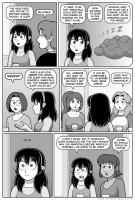Girl Genius for Friday, February 27, 2026
Feb. 27th, 2026 05:00 amPhotos: Water Garden
Feb. 26th, 2026 11:44 pm( Walk with me ... )
Photos: Worm Bin
Feb. 26th, 2026 11:27 pm( Walk with me ... )
Photos: House Yard
Feb. 26th, 2026 10:58 pm( Walk with me ... )
El Goonish Shive - falsekings-108
Feb. 27th, 2026 12:00 am
New comic!
Today's News:
- Sleeping as a cloud (EGSNP storyline Marker)
- Tedd's been warned about sleep (From Part 3 of Layers)
This was less a planned reveal and more two plus two equaling four.
I don't think I've specifically mentioned it in the comic, but I've considered Pandora sleeping for weeks on end at times unofficial canon, along with the reasons being one part boredom, one part being awake for long periods of time.
As a reminder, I only consider what's in the comic itself official canon. I can make claims down here, but they could end up never being confirmed canon.
Authorial intent has also been that Pandora didn't sleep at all during Sister 3.
It was while writing this page that I casually wrote Hope attributing the odd sleep schedule to immortal age. Immortals also become more powerful and mentally unstable with age.
Correlation doesn't mean causation, but that doesn't rule it out, either. At a minimum, it's worth considering as a potential contributing factor.
As for whether it really was a contributing factor, why are you asking me? I'm commentary Dan! Anything I say about canon might get disproven!
Speaking of Sleep
I actually got this page done with lots of time to spare. Yay. Which means it's time for me to stop writing this commentary and work on the next page for a bit. Bye!
--
Patreon bonus strip for FEBRUARY 2026 — SEIRRA
Feb. 27th, 2026 04:12 amEvery month at the Dumbing of Age Patreon there’s two new exclusive bonus strips — one that patrons get to vote on, and another that’s my choice! This month, folks voted for SIERRA! And it’s just in time! or is it Read this bonus strip and hundreds of previous at the Dumbing of Age Patreon!
Also, if you pledge up to $5 or more per month, you can read TOMORROW’s strip RIGHT NOW, every day!
#89 Work Discussion (part 1 of 2)
Feb. 26th, 2026 10:45 pmBy Dialecticdreamer/Sarah Williams
Part 1 of 2
Word count (story only): 1022
[Friday, May 15, 2020, 1:30 pm]
:: After work, Aidan gets home to an unexpected, but not unwelcome, chaos. Part of the Edison’s Mirror (Teague Family) story arc. ::
Back to Late Arrival (part 2)
To the Edison's Mirror Landing Page
On to
Aidan spent his work hours transplanting almost a hundred different melon seedlings, taking up the marked half of the fenced garden area. He replaced the wooden stakes with their plastic strips fluttering in the whimsical breezes with aluminum plant stakes. He’d embossed the name of each plant on the surface with a spent ballpoint pen. It was such an easy project compared to stamping or engraving, that Aidan’s appreciation of the modern conveniences had grown significantly by the end of the task.
Shandiin approached carrying a plain steel water bottle. The patterned navy scarf, glossy but probably a synthetic fiber instead of silk covered her head, while a navy wool scarf swayed against her torso, making the sage green turtleneck seem more saturate. She grinned. “You finished what I thought was a two day job in three hours. I’m impressed.”
“Thank you.” He accepted the water bottle with a shy grin. “Also, thanks for this.”
( Read more... )
Girls With Slingshots - GWS Hair of the Dog #849
Feb. 26th, 2026 10:00 pm
New comic!
Today's News:
Raise your hand if this is how you found GWS, because I know this strip was the gateway drug for a lot of readers!
Crafts
Feb. 26th, 2026 08:17 pmVocabulary: Proforestation
Feb. 26th, 2026 06:21 pmI am all in favor of stopping deforestation and protecting extant forests. However, there's more to the definition than that.
( Read more... )
Birdfeeding
Feb. 26th, 2026 12:50 pmI fed the birds. I've seen a few sparrows.
I put out water for the birds.
EDIT 2/26/26 -- I put out a fresh cake of peanut suet.
EDIT 2/26/26 -- I cut and labeled 4 more water jugs. These will hold native grasses: little bluestem, side-oats grama, northern sea oats, and switchgrass. It will be interesting to see how they do. Potted grasses tend to survive well but are more expensive. Broadcast seeding on the ground has variable results. So if I can find more and better ways to pot my own from seed, that's an improvement. Native grasses attract wildlife with food, shelter, and other resources. Many birds devour the seeds. Some butterflies, especially skippers, and other insects use native grasses as host plants. My prairie garden swarms with skippers and other butterflies in summer and into fall.
EDIT 2/26/26 -- I filled, sowed, and taped the milk jugs. This potting soil was wet enough that it didn't need watering. I thought I had some topsoil left, but I'm out of that; I'll need to restock in March. I put the four new jugs in the parking lot and tied them together.
While I was out there, a honeybee buzzed around, wishing to pollinate me, perhaps attracted to my bright coat. I had to explain that I was not a flower.
I've seen more sparrows and two male cardinals.
EDIT 2/26/26 -- I did a bit of work around the patio.
EDIT 2/26/26 -- I set up a simple worm bin in the log garden's leaf enclosure. I used an old 5-gallon bucket with a cracked bottom and a hole in one side. This will allow worms to go in and out as they please. I put some leaves inside to start, and packed more leaves around the bucket. Now I have somewhere that I can drop food scraps for the worms to eat, and cover with a handful of leaves. This gives me a place that will likely have plenty of worms when I want them -- such as for dropping into large planters -- and also where I can take a handful of very bioactive material to jump-start pots filled with potting mix with little or no bioactivity. When the bucket gets full, I can dump out the worm castings to use for fertilizing plants, sort out some worms, restart the bucket with more leaf litter, and drop in the worms.
There are, of course, commercially made worm bins that are much fancier and allow access to more outputs. However, these are expensive. Also they trap the worms inside, which is not great for an outdoor setup. This is free and better suited to its situation.
EDIT 2/26/26 -- I picked up the empty trough from last year's mini-water garden and moved it to the log garden, where I surrounded it with extra logs. I have taken pictures of the worm bin and the water garden.
EDIT 2/26/26 -- I did more work around the patio.
I heard a woodpecker drumming but didn't see it. I have seen a fox squirrel up a tree.
I am done for the night.
Thankful Thursday
Feb. 26th, 2026 05:37 pmToday I am thankful for...
- Getting Scarlet repaired under warranty by the dealer. I'll be more thankful when we finally get her back. NO thanks for me not being persistant enough contacting Lizzy's dealer -- we sent her out to some random scooter repair place to get a flat tire fixed, and she came back broken. Might be related to an intermittent glitch we've noticed. But still...
- Tea. Particularly genmaicha, 100g of which arrived at the house only a few minutes ago.
- Also coffee.
- Successfully trouble-shooting (home server)Nova -- turned out to be a bad power supply.
- Mathematical rabbit-holes. Or else not so thankful, because they take up time that might otherwise be productive
- Speed controls on videos. (Except for music videos, of course.)
Grrl Power #1438 – Pop goes the Gralien
Feb. 26th, 2026 11:00 amThe UCBA Party Barge and Recovery ship is large enough and custom built to pull even something/one the size of U.M.B.Rage off the surface. The ship is roughly the size of the Fhloston Paradise, with slightly fewer pools and more space dedicated to kaiju sized med-bays. But it still is a party barge, and is generally considered a premier location to view the battles.
Sydney’s still wearing a bra, by the way. You can see part of the strap under Frix’s fingers if you look close enough. I drew her, then added him because I have a bad habit of drawing only the people talking in a scene, since each character I draw adds to the time to pencil, ink and color. But I figured I’d just be drawing neck to waist, and how hard can that be – oh right, even after all this time I don’t know what humanoid bodies look like, so naturally it took me like 30 minutes to pencil his torso, cause the arm position and the inside of the elbow joint looked weird and I finally had to go looking for reference, but of course, there are no pictures of really muscular guys on the internet standing in that position. They’re always flexing. Or maybe standing casually, but try to find a picture of a muscular man or woman lounging, or talking on a phone or resting their cheek on their hand and now you’ve got a challenge.
You know, sometimes I complain about my job, but then I remember that I have never once had to use Excel or sit in a Zoom meeting that should have been an email or had to sit through an embarrassingly outdated HR video. I mean, not at this job. I’ve done that stuff at other jobs. Well, Zoom didn’t exist back then. It was probably Skype, and there was never a point at which Skype didn’t suck a to a surprising degree.
Also, I should mention that Sydney is still sporting holo-boobs. Even still, she’s self conscious about exposing fake boobs so long as they’re attached to her.
Do you realize it’s 02-26-2026? If you reverse the order of the month numerals, you get 20262026! And if you’re a numerologist… that means you’re stupid! It has nothing to do with the date. I’m just throwing shade at one of the saddest pseudosciences just cause the date is almost a meaningless repeating number if you change the numbers so that they repeat how you want. I dunno what’s up with the drive by. Just feeling sassy tonight.
 Here is Gaxgy’s painting Maxima promised him. Weird how he draws almost exactly like me.
Here is Gaxgy’s painting Maxima promised him. Weird how he draws almost exactly like me.
I did try and do an oil painting version of this, by actually re-painting over the whole thing with brush-strokey brushes, but what I figured out is that most brushy oil paintings are kind of low detail. Sure, a skilled painter like Bob Ross or whoever can dab a brush down a canvas and make a great looking tree or a shed with shingles, but in trying to preserve the detail of my picture (eyelashes, reflections, etc) was that I had to keep making the brush smaller and smaller, and the end result was that honestly, it didn’t really look all that oil-painted. I’ll post that version over at Patreon, just for fun, but I kind of quit on it after getting mostly done with re-painting Max.
Patreon has a no-dragon-bikini version of of the picture as well, naturally.
Double res version will be posted over at Patreon. Feel free to contribute as much as you like.
CodeSOD: The Counting Machine
Feb. 26th, 2026 06:30 amIndustrial machines are generally accompanied by "Human Machine Interfaces", HMIs. This is industrial slang for a little computerized box you use to control the industrial machine. All the key logic and core functionality and especially the safety functionality is handled at a deeper computer layer in the system. The HMI is just buttons users can push to interact with the machine.
Purchasers of those pieces of industrial equipment often want to customize that user interface. They want to guide users away from functions they don't need, or make their specific workflow clear, or even just brand the UI. This means that the vendor needs to publish an API for their HMI.
Which brings us to Wendy. She works for a manufacturing company which wants to customize the HMI on a piece of industrial equipment in a factory. That means Wendy has been reading the docs and poking at the open-sourced portions of the code, and these raise more questions than they answer.
For example, the HMI's API provides its own set of collection types, in C#. We can wonder why they'd do such a thing, which is certainly a WTF in itself, but this representative line raises even more questions than that:
Int32 Count { get; set; }
What happens if you use the public set operation on the count of items in a collection? I don't know. Wendy doesn't either, as she writes:
I'm really tempted to set the count but I fear the consequences.
All I can hear in my head when I think about "setting the Count" is: "One! One null reference exception! Two! TWO null reference exceptions! HA HA HA HA!"

By http://muppet.wikia.com/wiki/Count_von_Count





